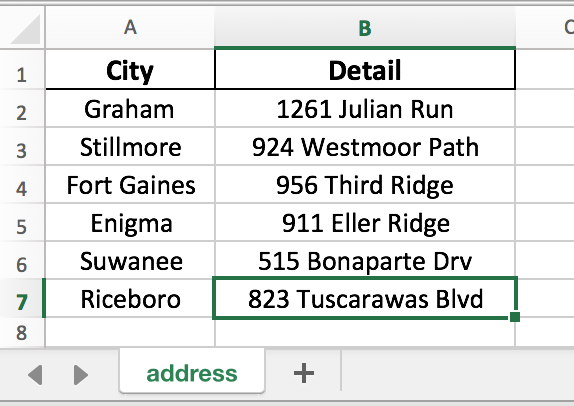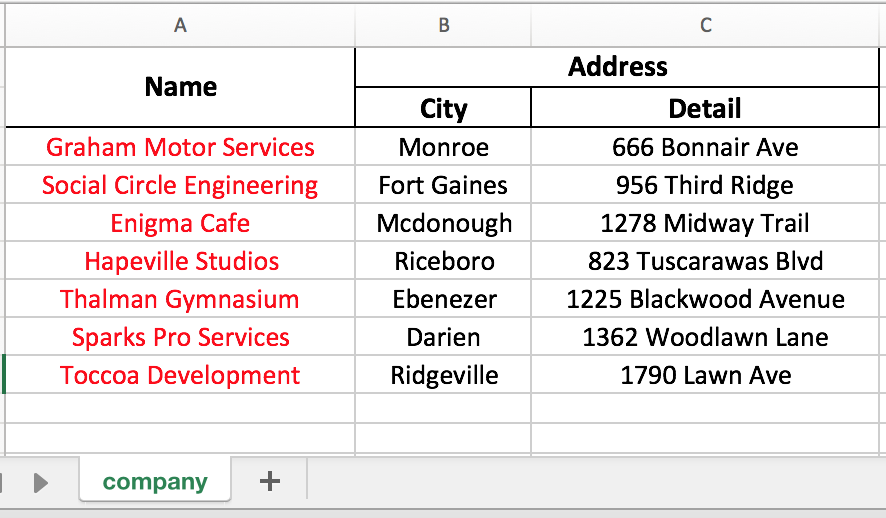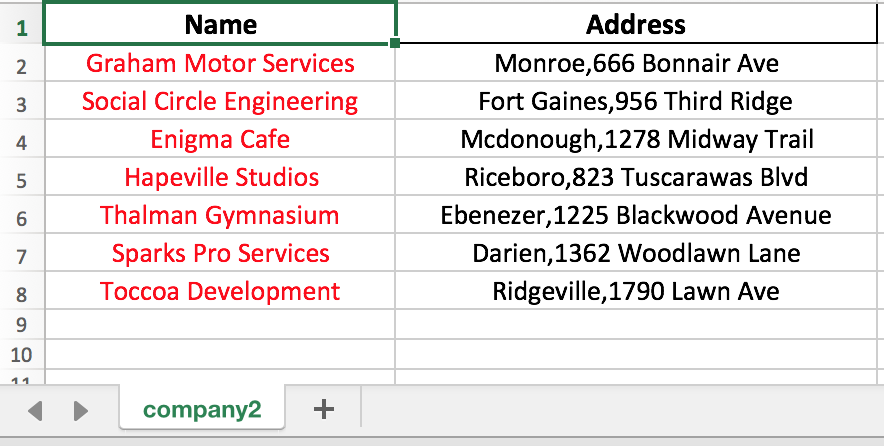A simple Java excel import and export tool aiming to not touch Apache POI API for simply import or export excel. At the meantime,you can customize cell style,validate importing data according some rule and convert data you want
Talk less,directly see a picutre

Add dependency
<dependency>
<groupId>cn.chenhuanming</groupId>
<artifactId>octopus</artifactId>
<version>1.1.4</version>
</dependency>Let's begin with simplest example,to export some addresses.Only two fields in Address class
@Data
@AllArgsConstructor
public class Address {
private String city;
private String detail;
}Before exporting,we must create a XML config to define how and what to export
<?xml version="1.0" encoding="UTF-8"?>
<Root xmlns:xsi="http://www.w3.org/2001/XMLSchema-instance"
xsi:noNamespaceSchemaLocation="https://raw.githubusercontent.com/zerouwar/my-maven-repo/master/cn/chenhuanming/octopus/1.1.0/octopus.xsd"
class="cn.chenhuanming.octopus.entity.Address">
<Field name="city" description="City"/>
<Field name="detail" description="Detail"/>
</Root>First,create a root element named Root.Here refer a octopus.xsd file to help us compose XML code.
Second,assign class attribute,which is the class name we will export
Last,create two Field element,representing two column data read from Address we will export.
Value of Attribute name is the field name of Address.
Actually Octopus get value from its getter method,so make sure there is a getter method.
Attribute description will be used to draw header
Let's do the last thing,writing Java code
public class AddressExample {
List<Address> addresses;
/**
* make testing data
*/
@Before
public void prepare() {
addresses = new ArrayList<>();
DataFactory df = new DataFactory();
for (int i = 0; i < df.getNumberBetween(5, 10); i++) {
addresses.add(new Address(df.getCity(), df.getAddress()));
}
}
@Test
public void export() throws FileNotFoundException {
//where to export
String rootPath = this.getClass().getClassLoader().getResource("").getPath();
FileOutputStream os = new FileOutputStream(rootPath + "/address.xlsx");
//read config from address.xml
InputStream is = this.getClass().getClassLoader().getResourceAsStream("address.xml");
Config config = new XmlConfigFactory(is).getConfig();
try {
Octopus.writeOneSheet(os, config, "address", addresses);
} catch (IOException e) {
System.out.println("export failed");
}
}
}This is a complete unit test.In fact,exporting Excel only needs two steps:
- By
ConfigFacotry,get aConfiginstance from XML config file or through java config - Call
Octopus.writeOneSheet()and pass exporting file,config,name of sheet and data
Here is exporting excel file
Octopus supports exporting complicated object and drawing header automatically.
This Time we need to export some companies.Here is Company class
@Data
@AllArgsConstructor
public class Company {
private String name;
private Address address;
}And we create a XML config file named company.xml
<Root xmlns:xsi="http://www.w3.org/2001/XMLSchema-instance"
xsi:noNamespaceSchemaLocation="https://raw.githubusercontent.com/zerouwar/my-maven-repo/master/cn/chenhuanming/octopus/1.1.0/octopus.xsd"
class="cn.chenhuanming.octopus.entity.Address">
<Field name="name"
description="Name"
color="#ff0000"/>
<Header name="address" description="Address">
<Field name="city" description="City"/>
<Field name="detail" description="Detail"/>
</Header>
</Root>We use Header element representing a complicated field in company object,and set font color of name to #ff0000
The Java code is almost the same as before
public class CompanyExample {
List<Company> companies;
/**
* make testing data
*/
@Before
public void prepare() {
companies = new ArrayList<>();
DataFactory df = new DataFactory();
for (int i = 0; i < df.getNumberBetween(5, 10); i++) {
companies.add(new Company(df.getBusinessName(), new Address(df.getCity(), df.getAddress())));
}
}
@Test
public void export() throws FileNotFoundException {
//where to export
String rootPath = this.getClass().getClassLoader().getResource("").getPath();
FileOutputStream os = new FileOutputStream(rootPath + "/company.xlsx");
//read config from company.xml
InputStream is = this.getClass().getClassLoader().getResourceAsStream("company.xml");
Config config = new XmlConfigFactory(is).getConfig();
try {
Octopus.writeOneSheet(os, config, "company", companies);
} catch (IOException e) {
System.out.println("export failed");
}
}
}This is the final exporting excel file
Octopus can handle more complicated data,you can check this from cn.chenhuanming.octopus.example.ApplicantExample in test classpath
Sometimes you want to convert exporting data.For example,in previous example,we don't want to export entire Address,just make this like a string.
All we need is implementing Formatter
public class AddressFormatter implements Formatter<Address> {
@Override
public String format(Address address) {
return address.getCity() + "," + address.getDetail();
}
@Override
public Address parse(String str) {
String[] split = str.split(",");
if (split.length != 2) {
return null;
}
return new Address(split[0], split[1]);
}
}parse method is used in importing excel,so just pay attention on format method.It accepts a Addressobject and returns aString` object.
At last,put this into XML file
<Field name="name"
description="Name"
color="#ff0000"/>
<Field name="address"
description="Address"
formatter="cn.chenhuanming.octopus.formatter.AddressFormatter"/>Exporting excel will be like this
We directly reuse previous example to see how to import a excel.Reuse Config object,just change Java code
//First get the excel file
FileInputStream fis = new FileInputStream(rootPath + "/company2.xlsx");
try {
SheetReader<Company> importData = Octopus.readFirstSheet(fis, config, new DefaultCellPosition(1, 0));
for (Company company : importData) {
System.out.println(company);
}
} catch (Exception e) {
System.out.println("import failed");
}And check the output of terminal.See,AddressFormatter we created works!
Company(name=Graham Motor Services, address=Address(city=Monroe, detail=666 Bonnair Ave))
Company(name=Social Circle Engineering, address=Address(city=Fort Gaines, detail=956 Third Ridge))
Company(name=Enigma Cafe, address=Address(city=Mcdonough, detail=1278 Midway Trail))
Company(name=Hapeville Studios, address=Address(city=Riceboro, detail=823 Tuscarawas Blvd))
Company(name=Thalman Gymnasium, address=Address(city=Ebenezer, detail=1225 Blackwood Avenue))
Company(name=Sparks Pro Services, address=Address(city=Darien, detail=1362 Woodlawn Lane))
Company(name=Toccoa Development, address=Address(city=Ridgeville, detail=1790 Lawn Ave))
SomeTimes we have some requirements for importing data.Octopus provides simple validation config.
First of all,we add a field status for Company class.And value of status is only one of good,bad and closed,name can not be empty.
Let's check out XML config
<?xml version="1.0" encoding="UTF-8"?>
<Root xmlns:xsi="http://www.w3.org/2001/XMLSchema-instance"
xsi:noNamespaceSchemaLocation="https://raw.githubusercontent.com/zerouwar/my-maven-repo/master/cn/chenhuanming/octopus/1.1.0/octopus.xsd"
class="cn.chenhuanming.octopus.entity.Company">
<Field name="name"
description="Name"
color="#ff0000"
is-blankable="false"/>
<Field name="address"
description="Address"
formatter="cn.chenhuanming.octopus.formatter.AddressFormatter"
/>
<Field name="status"
description="Status"
options="good|bad|closed"/>
<!--| split options -->
</Root>Here is the excel we will import,there are three wrong.
And the Java code
@Test
public void importCheckedData() throws IOException, InvalidFormatException {
InputStream is = this.getClass().getClassLoader().getResourceAsStream("wrongCompany.xlsx");
Config config = new XmlConfigFactory(this.getClass().getClassLoader().getResourceAsStream("company3.xml")).getConfig();
final SheetReader<CheckedData<Company>> sheetReader = Octopus.readFirstSheetWithValidation(is,config,new DefaultCellPosition(1,0));
for (CheckedData<Company> checkedData : sheetReader) {
System.out.println(checkedData);
}
}We call Octopus.readFirstSheetWithValidation and get SheetReader with result of validation.Check the terminal
CheckedData(data=Company(name=Graham Motor Services, address=Address(city=Monroe, detail=666 Bonnair Ave), status=good), exceptions=[])
CheckedData(data=Company(name=Social Circle Engineering, address=Address(city=Fort Gaines, detail=956 Third Ridge), status=null), exceptions=[cn.chenhuanming.octopus.exception.NotAllowValueException])
CheckedData(data=Company(name=null, address=Address(city=Mcdonough, detail=1278 Midway Trail), status=null), exceptions=[cn.chenhuanming.octopus.exception.CanNotBeBlankException, cn.chenhuanming.octopus.exception.NotAllowValueException])
CheckData has data and exceptions.In exceptions,it saves all exceptions of every cell occurred in importing.All of them are subclass of ParseException
Besides is-blankable and options,you can apply regular expression validation through regex.When validate fails,it will throw corresponding ParseException
is-blankable:throwsCanNotBeBlankExceptionoptions:throwsNotAllowValueExceptionregex:throwsPatternNotMatchException
You can handle more with these exceptions.If it can not be satisfied with you,you can throws ParseException in paese method of Formatters.
Octopus will catch them,put into exceptions and fill with position of cell and config info at the same time.
All example could be founud at cn.chenhuanming.octopus.example,you can run and check these examples
We recommend using XML to configure the import and export formats, because XML configuration is not coupled with classes and is more flexible than annotations.
Sometimes, however, users may be less concerned about flexibility and want to put configuration and data classes together, so annotation can be used.
Annotations are similar to XML files, There are @Sheet,@Formatter,@Header,@Field:
@Sheeton class, with a optionalformattersattribute represents the global formatter@Formatterrepresents a formatter as theformattersattribute value of@Sheet@Headeron a field of the data class, indicating that the field is a composite field@Fieldon a field of the data class, indicating that the field is a single field
Please refer to the XML file for the attribute values of the annotations(show as above examples). The following is an annotation example of a data class:
@Sheet(formatters = {
@Formatter(target = BigDecimal.class, format = BigDecimalFormatter.class),
})
public class Applicants {
@Field(description = "Value", color = "#74f441")
private int id;
@Field(description = "Name", fontSize = 20, border = "0,2,0,2", borderColor = ",#4242f4,,#4242f4")
private String name;
@Header(description = "Job", headerColor = "#4286f4")
private Job job;
@Field(description = "Entry Date", dateFormat = "yyyy-MM-dd")
private Date entryDate;
@Field(description = "Working/Leaved", options = "Working|Leaved",
formatter = cn.chenhuanming.octopus.formatter.WorkingFormatter.class, color = "#42f4b9")
private boolean working = true;
}Usage:
Config config = new AnnotationConfigFactory(Applicants.class).getConfig();
// ... use config ...Octopus provides one-code-api,get rid of Apache API。If you really need Apache POI,check core class SheetWriter和SheetReader
New a issue or email chenhuanming.cn@gmail.com





